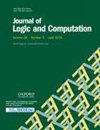半格上一阶逻辑的片段非分配正逻辑
IF 0.7
4区 数学
Q3 COMPUTER SCIENCE, THEORY & METHODS
引用次数: 0
摘要
我们将非分配的正逻辑描述为一种单排序一阶语言的片段,这种语言被一种新的模拟概念(称为meet-simulation)所保存。会面模拟不同于模拟,因为它们将一个模型中的成对状态与另一个模型中的单个状态联系起来。在得到这个结果的过程中,我们使用了一种更传统的模拟概念,并证明了hennessy - milner风格的定理,使用了一种称为满足紧致的模态饱和模拟。本文章由计算机程序翻译,如有差异,请以英文原文为准。
Non-distributive positive logic as a fragment of first-order logic over semilattices
We characterize non-distributive positive logic as the fragment of a single-sorted first-order language that is preserved by a new notion of simulation called a meet-simulation. Meet-simulations distinguish themselves from simulations because they relate pairs of states from one model to single states from another. En route to this result, we use a more traditional notion of simulations and prove a Hennessy–Milner-style theorem for it, using an analogue of modal saturation called meet-compactness.
求助全文
通过发布文献求助,成功后即可免费获取论文全文。
去求助
来源期刊

Journal of Logic and Computation
工程技术-计算机:理论方法
CiteScore
1.90
自引率
14.30%
发文量
82
审稿时长
6-12 weeks
期刊介绍:
Logic has found application in virtually all aspects of Information Technology, from software engineering and hardware to programming and artificial intelligence. Indeed, logic, artificial intelligence and theoretical computing are influencing each other to the extent that a new interdisciplinary area of Logic and Computation is emerging.
The Journal of Logic and Computation aims to promote the growth of logic and computing, including, among others, the following areas of interest: Logical Systems, such as classical and non-classical logic, constructive logic, categorical logic, modal logic, type theory, feasible maths.... Logical issues in logic programming, knowledge-based systems and automated reasoning; logical issues in knowledge representation, such as non-monotonic reasoning and systems of knowledge and belief; logics and semantics of programming; specification and verification of programs and systems; applications of logic in hardware and VLSI, natural language, concurrent computation, planning, and databases. The bulk of the content is technical scientific papers, although letters, reviews, and discussions, as well as relevant conference reviews, are included.
 求助内容:
求助内容: 应助结果提醒方式:
应助结果提醒方式:


